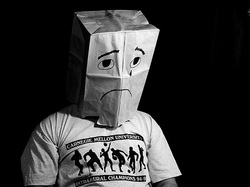
In a different therapy session I learned about cognitive distortions. Alcoholics Anonymous grants the same concept a different name: stinkin' thinkin'. Cognitive distortions are thoughts that have been corrupted, distorted, or skewed in such a way as to produce error of reality.
An example of a cognitive distortion would be thinking that someone did not like me because when the person saw me in a public context he or she did not interact with me. The reality of the situation, however, could have had various potentials, none of which had anything to do with how the person feltabout me as a human being.
The danger with cognitive distortions is that they can manifest in a manner in which affects my feelings or emotions. In the above situation, I may have felt rejected because the person did not acknowledge me. This, in turn, could have led me to a desperate need for affection, whereby I looked for intimate and immediate gratification, either sexual or non-sexual, whether with another person or even through pornography. If acted upon, shame is but one result.
Such could have been avoided, though, by considering other options as to why the individual did not acknowledge me. For example, perhaps the person did not see me. Perhaps the person did not recognize me from a distance. Perhaps the person was distracted, being in a hurry, or preoccupied with thoughts of his or her own. But by allowing distorted, presumptuous thoughts to consume my mind, I allowed them to affect my emotions, which then led to wrong behavior, producing feelings of shame.
Shame can act as a cognitive distortion when it is perceived as though something is wrong with me as a human being. Even in my context, when I sinned against my roommate last year, there was nothing wrong me as a human being. What was wrong within me were cognitive distortions. My corrupt thoughts regarding my roommate affected my feelings toward him, which, in turn, led me to behave in such a way that was sinful and disrespectful of him as both a human being and as a brother in Christ.
The public humiliation of my exposed sin only compounded my shame. I remember, however, a Southern Baptist pastor coming to me in private and encouraging me to find a way past the shame. He shared with me a time in his own life when he had to force himself to move past his own shame for a sin he had committed. He told me that I would be no use for the kingdom until I found a way past the shame.
From therapy I learned that the shame I felt was due to genuine contrition and repentance. I was able, upon months of reflection, to honestly and objectively view my actions as shameful without thinking of myself -- my very existence -- as shameful. I realized that my actions were triggered by my feelings, which were triggered by my cognitive distortions. Had I been thinking properly, or not entertaining distorted thoughts, I, and so many others, could avoided that nightmare I created.
From Scripture I learned that Jesus took the shameful behavior I committed against my roommate upon Himself, though He despised and scorned that shame, and then sat down next to His Father in glory (Heb. 12:2). My sinful, shameful behavior has been cleansed by the blood of Jesus, and I will never be held accountable for it by God. He accounts me as righteous (Rom. 3:21, 22), justified (Rom. 5:1), sanctified (Acts 26:18), and glorified (Rom. 8:30) in Christ, though I have sinned.
By God's grace and mercy to me in Christ, I am forbidden to accept shame as my identity. I am allowed to feel ashamed of my sinful behavior; but in Christ, having received His forgiveness, I am not permitted to view my existence as one of utter, hopeless shame. Only the gospel of grace grants such overwhelming accomplishment over failure, grief, and shame. I hope that you, in and through union with Christ by the grace of God, will internalize these truths for yourself.
This honest post was written by William W Birch. You can find his website here: http://www.williambirch.net
 RSS Feed
RSS Feed